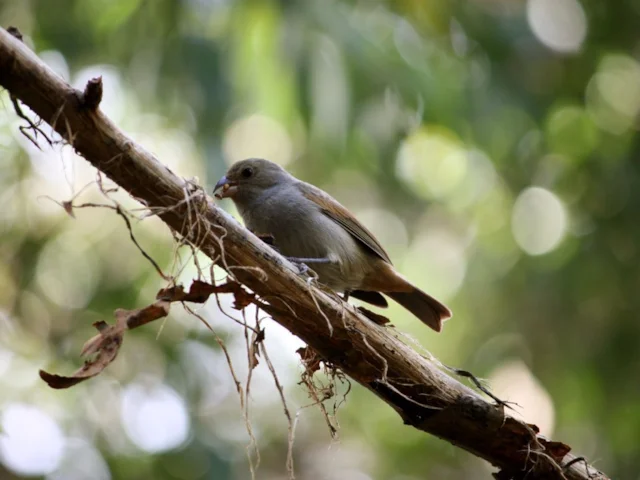String pulling birds of Barbados
f358eb95-3d5d-4922-adec-ab0759c43913

Two Barbados species have graduated into the small select club of birds that can solve a complex cognition test.
Barbados Bullfinch and Carib Grackle can both pass the popular animal cognition test of 'string-pulling', where food is suspended in a cylindrical container attached to a perch using string, which can be reached by a series of co-ordinated actions.
String-pulling is considered one of the most complex problem-solving tasks for animals, and is used to try to gauge whether an animal has some understanding of cause and effect. Birds generally pull the string suspending the food up in increments while holding the string with their feet.
While many birds, including several corvids and parrots, are capable of performing this test, the association between string-pulling and cognitive traits has not been fully explored, and most previous studies were carried out using captive birds. However, this ability may be unrelated to performance on six other cognitive tests, according a new study from McGill University, Canada published in the open-access journal PLOS ONE this week.
The authors tested the string-pulling ability of wild-caught Carib Grackles and Barbados Bullfinches. In addition, to determine if individual variation in performance could be predicted by results on other tasks, the authors compared the birds' performance on string-pulling to six other behavioural measures including problem solving, temperament, and learning. Previously published work has shown that some Carib Grackles seem 'brighter' or faster learners than others, while Barbados Bullfinch is known to be highly adaptable and opportunistic.
Two of the 31 grackles and 18 of the 42 bullfinches passed the string-pulling test. Due to the low number of successful grackles, further correlational analysis was not possible. However, string-pulling performance in bullfinches was found to be unrelated to any of the other tasks tested.
The authors also found that string-pulling performance improved in some birds when given a second chance, suggesting that in at least some individuals, trial-and-error learning may have occurred. However, the authors note that because birds included in this study were wild-caught, the possibility that differences in individual experience in the field may have affected performance cannot be excluded. The authors suggest that many skills may be involved in a bird’s performance on the string-pulling task.
The paper will be available on its publication date of Wednesday 17 August here.
Reference
Audet J-N, Ducatez S, and Lefebvre L. 2016. Bajan Birds Pull Strings: Two Wild Antillean Species Enter the Select Club of String-Pullers. PLoS ONE 11: e0156112. DOI:10.1371/journal.pone.0156112.
Barbados Bullfinch and Carib Grackle can both pass the popular animal cognition test of 'string-pulling', where food is suspended in a cylindrical container attached to a perch using string, which can be reached by a series of co-ordinated actions.
String-pulling is considered one of the most complex problem-solving tasks for animals, and is used to try to gauge whether an animal has some understanding of cause and effect. Birds generally pull the string suspending the food up in increments while holding the string with their feet.
While many birds, including several corvids and parrots, are capable of performing this test, the association between string-pulling and cognitive traits has not been fully explored, and most previous studies were carried out using captive birds. However, this ability may be unrelated to performance on six other cognitive tests, according a new study from McGill University, Canada published in the open-access journal PLOS ONE this week.
The authors tested the string-pulling ability of wild-caught Carib Grackles and Barbados Bullfinches. In addition, to determine if individual variation in performance could be predicted by results on other tasks, the authors compared the birds' performance on string-pulling to six other behavioural measures including problem solving, temperament, and learning. Previously published work has shown that some Carib Grackles seem 'brighter' or faster learners than others, while Barbados Bullfinch is known to be highly adaptable and opportunistic.
| A Carib Grackle quickly 'figures out' how to perform the task of string pulling. Video: Jean-Nicolas Audet. |
Two of the 31 grackles and 18 of the 42 bullfinches passed the string-pulling test. Due to the low number of successful grackles, further correlational analysis was not possible. However, string-pulling performance in bullfinches was found to be unrelated to any of the other tasks tested.
The authors also found that string-pulling performance improved in some birds when given a second chance, suggesting that in at least some individuals, trial-and-error learning may have occurred. However, the authors note that because birds included in this study were wild-caught, the possibility that differences in individual experience in the field may have affected performance cannot be excluded. The authors suggest that many skills may be involved in a bird’s performance on the string-pulling task.
The paper will be available on its publication date of Wednesday 17 August here.
Reference
Audet J-N, Ducatez S, and Lefebvre L. 2016. Bajan Birds Pull Strings: Two Wild Antillean Species Enter the Select Club of String-Pullers. PLoS ONE 11: e0156112. DOI:10.1371/journal.pone.0156112.

